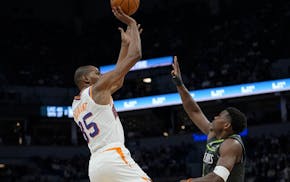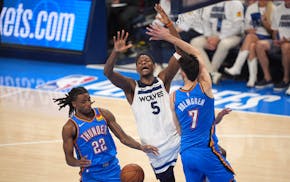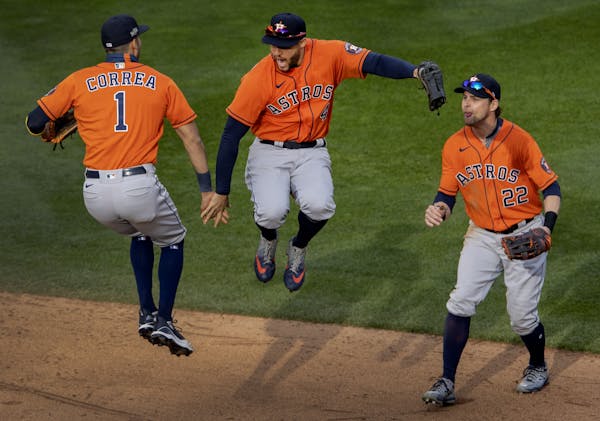When October arrives, your local baseball team becomes the Minnesota Twinge.
A sudden, sharp, localized pain.
Tuesday, the Twins lost their 17th consecutive postseason game. The score — 4-1, this time to the Houston Astros — should sound familiar.
The Twins' postseason losing streak is the longest in baseball history by four games, and is now the longest in American professional sports history, and while manager Rocco Baldelli and many players say that streak is not relevant or applicable to them, the streak for many of the key players in their clubhouse is now five.
Those five losses have something in common: Position players performing as if they can't remove their hands from their throats.
The stage lights are too bright for these wide eyes.
Take the wild-card game at Yankee Stadium in 2017, the three-game sweep against the Yankees last year and the loss to Houston on Tuesday, and there is a theme: The Twins have not scored more than four runs in any of those games. Their average production per game: 2.4 runs and seven hits.
They lost Game 1 at Yankee Stadium last year because they failed to produce runs in the late innings or make basic fielding plays, and those problems reoccured Tuesday.
They managed only four hits and didn't score after the third inning, and two unmade plays — third baseman Marwin Gonzalez's deflection of a hard-hit ball in the seventh and shortstop Jorge Polanco's errant throw in the ninth — handed the game to Houston.
Wednesday, the Twins will face elimination at Target Field, and this time if they lose they won't be able to blame the aura of Yankee Stadium or the size or the Yankees payroll.
The Astros, by playoff standards, stink. They finished the season 29-31. In Game 1, they started Zack Greinke, who had a 6.08 ERA in September and went 0-2 with a 4.68 ERA last postseason.
The Twins had him on the ropes in the first inning, loading the bases with one out, but didn't produce a run. Greinke left after four innings, having given up only one run.
Then the Twins did nothing in five innings against Framber Valdez, a talented lefty who nevertheless had a 4.19 big-league ERA at the end of the regular season.
The Twins made him look like a lefthanded Luis Tiant.
They haven't won a postseason game since Game 1 of the 2004 ALDS against the Yankees, when Johan Santana pitched seven shutout innings and won 2-0.
The Twins haven't scored more than four runs in a playoff game since Game 4 of that series, which they lost 6-5 in 11 innings.
They haven't scored more than five runs in a playoff game since beating Oakland 11-2 in Game 4 of the 2002 ALDS.
That team featured a young, free-swinging lineup that overcame the famed A's rotation of Mark Mulder, Tim Hudson and Barry Zito.
The current Twins, with an esteemed veteran leader and slugger in Nelson Cruz, are supposed to be driven by their lineup, but their only run Tuesday scored because Astros right fielder Josh Reddick seemed to play Cruz's liner to the base of the right field wall as if it were toxic, enabling Max Kepler to score from first.
Once again the Bomba Squad, in the playoffs, performed as if embalmed.
"We trust our offense," catcher Ryan Jeffers said. "There's obviously going to be frustrations — it's a frustrating game. We know we can come back from anything."
Jeffers was the only position player who consented to a postgame Zoom interview with the Twins' press corps — which is unfair for him, a rookie facing questions about a losing streak in which he played six innings.
This is what reporters and fans miss without clubhouse access: Reporters can't seek out insights and answers, can't reflect clubhouse emotion.
"If we expect to come out here and win, we have to play better," manager Rocco Baldelli said. "I've seen our guys win these games, exactly like the one we just watched. Today we just did not."
All the Twins did Tuesday was prove that they are allergic to the postseason, not just pinstripes.
Jim Souhan's podcast can be heard at TalkNorth.com. On Twitter: @SouhanStrib. • jsouhan@startribune.com

Souhan: Anxiety and depression in the NFL helped inspire Lindsey Young's children's book
Souhan: For Lynx star Napheesa Collier, 'Phee' is just fine

Souhan: Will the Wolves trade for Kevin Durant? Should they?

Souhan: If Edwards is a franchise player, he needs to act and play like it


